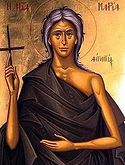

| Previous day | Next day |
| Old Style
April 1
|
Monday |
New Style
April 14
|
|
Passion Week.
Great Lent. |
Monastic rule: xerophagy (bread, uncooked fruits and vegetables).
|
![]() St. Mary of Egypt (522).
St. Mary of Egypt (522). ![]() St. Euthymius the Wonderworker, archimandrite, of Suzdal (1404). St. Barsanuphius of Optina Monastery (1913).
St. Euthymius the Wonderworker, archimandrite, of Suzdal (1404). St. Barsanuphius of Optina Monastery (1913).
Martyrs Gerontius and Basilides (3rd c.). St. Macarius, abbot, of Pelecete (ca. 830). Martyr Abraham of the Bulgars on the Volga (1229). St. Gerontius, canonarch of the Kiev Caves (14th c.). St. Pachomius, archbishop of Roman and Galati (Moldavia) and monk of the Kiev Caves (1724).
New Hieromartyr Sergius Zavarin, archpriest, of Yaroslavl (1938). New Hiero-confessor Schema-bishop Macarius (Vasiliev), at the Pskov Caves Monastery (1944).
St. Meliton, bishop of Sardis (177). Martyr Romanus of Raqqa (Syria) (780). St. Procopius, abbot, of Sazava in Bohemia (1053). Sts. John of Shavta, bishop of Gaenati (7th c.-13th c.) and Eulogius the Prophet, fool-for-Christ (13th c.). of Georgia. Nun-Martyr Stephanida of Bitola and Skadar (1944).
Thoughts for Each Day of the Year
According to the Daily Church Readings from the Word of God
By St. Theophan the Recluse

Monday (Holy Week). [Matt. 24:3–35]
The Lord goes to a voluntary passion. We must accompany Him. This is the duty of anyone who confesses that by the power of Christ’s passion he has become who he is now, and of anyone who hopes to receive something which is so great and glorious, that it could not even enter one’s mind. How must one accompany Him? Through reflection and sympathy. Follow the suffering Lord in thought; and in your reflection extract such impressions as could strike your heart and bring it to feel the sufferings which were borne by the Lord. In order to better accomplish this, you must make yourself suffer through perceptible lessening of food and sleep, and an increase in the labour of standing and kneeling. Fulfil all that the Holy Church does, and you will be a good fellow-traveller of the Lord to His sufferings.
Articles
 Venerable Euthymius of SuzdalThe ascetic struggles of Saint Euthymius were so great that Saint Dionysius advised him to lessen them. |
 Venerable Barsanuphius of Optina |
 Martyrs Gerontius and BasilidesThe Martyrs Gerontius and Basilides suffered martyrdom for Christ in the third century. |
 Venerable Macarius the Abbot of PeleceteSaint Macarius was born at Constantinople in 785. While still a child, he lost his parents. |
 Martyr Abraham of BulgariaThe Holy Martyr Abraham the Bulgar, Vladimir Wonderworker, lived during the thirteenth century, and was descended from the Kamska Bulgars and brought up as a Moslem. |
 Venerable Gerontius the Canonarch of the Kiev Far CavesHe spent all his life at the monastery, in ascetic deeds of abstinence, obedience, and prayer. |






